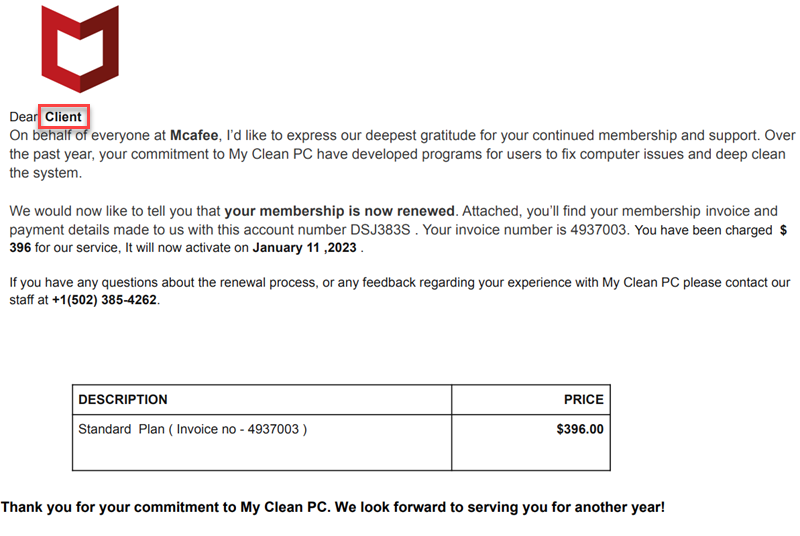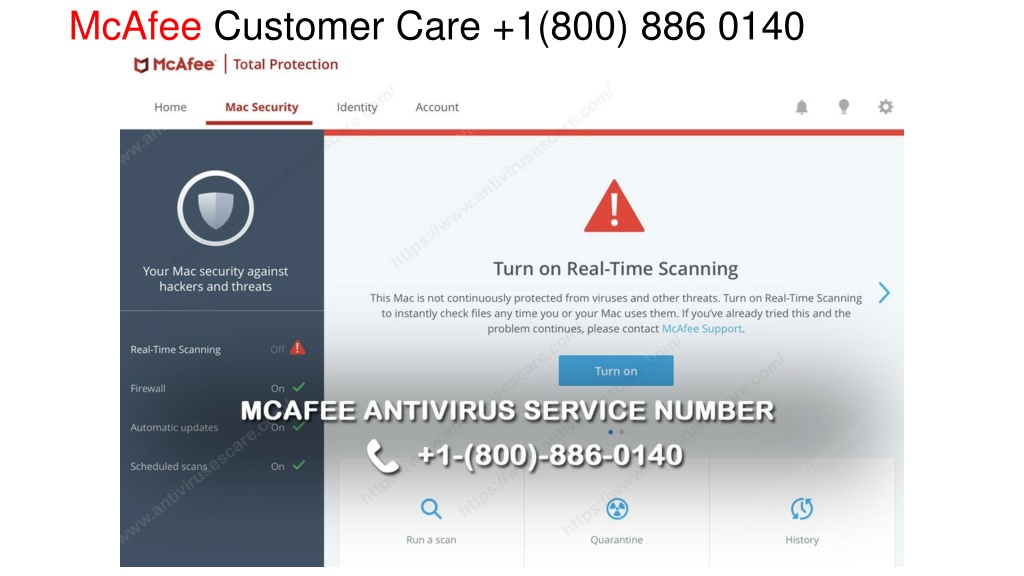Have you ever been the victim of a McAfee customer service scam?
McAfee customer service scams are a type of online fraud in which scammers pose as representatives of McAfee, a well-known antivirus software company. These scammers typically contact victims via phone, email, or live chat, and they often use high-pressure sales tactics to convince victims to purchase unnecessary services or products.
There are a number of ways to protect yourself from McAfee customer service scams. First, be wary of any unsolicited contact from someone claiming to be from McAfee. Second, never give out your personal information or financial details to someone you don't know. Third, if you're unsure whether or not a contact is legitimate, contact McAfee directly.
Read also:What Is Larsa Pippens Current Relationship Status
If you believe you have been the victim of a McAfee customer service scam, you should report it to McAfee and to the Federal Trade Commission (FTC). You can also file a complaint with your local consumer protection agency.
By following these tips, you can help protect yourself from McAfee customer service scams.
mcafee customer service scams
mcafee customer service scams are a type of online fraud that can be very costly for victims. Scammers often use high-pressure sales tactics to convince victims to purchase unnecessary services or products. In some cases, scammers may even steal victims' personal information or financial details.
- Online fraud
- High-pressure sales tactics
- Unsolicited contact
- Personal information theft
- Financial fraud
- Identity theft
mcafee customer service scams can be very difficult to spot, as scammers often use sophisticated tactics to deceive victims. However, there are a number of things you can do to protect yourself from these scams, including:
- Be wary of any unsolicited contact from someone claiming to be from McAfee.
- Never give out your personal information or financial details to someone you don't know.
- If you're unsure whether or not a contact is legitimate, contact McAfee directly.
- Report any suspicious activity to McAfee and to the Federal Trade Commission (FTC).
By following these tips, you can help protect yourself from mcafee customer service scams.
1. Online fraud
Online fraud is a serious problem that can have a devastating impact on victims. McAfee customer service scams are a type of online fraud that can be particularly costly, as scammers often use high-pressure sales tactics to convince victims to purchase unnecessary services or products.
Read also:Debunking We Wuz Kangz Unmasking The Historical Truth
- Phishing
Phishing is a type of online fraud in which scammers send emails or text messages that appear to be from legitimate companies or organizations. These messages often contain links to fake websites that are designed to trick victims into giving up their personal information or financial details.
- Malware
Malware is a type of software that can be installed on your computer without your knowledge or consent. Malware can be used to steal your personal information, track your online activity, or even take control of your computer.
- Identity theft
Identity theft occurs when someone steals your personal information and uses it to commit fraud. Identity theft can have a devastating impact on victims, as it can lead to financial loss, damage to your credit, and even criminal charges.
- Financial fraud
Financial fraud occurs when someone uses your financial information to make unauthorized purchases or withdrawals. Financial fraud can be very costly for victims, as it can lead to significant financial losses.
These are just a few of the many types of online fraud that exist. McAfee customer service scams are a particularly insidious type of online fraud, as they often target people who are seeking help with their computer problems. By being aware of the different types of online fraud, you can take steps to protect yourself from becoming a victim.
2. High-pressure sales tactics
High-pressure sales tactics are a common component of mcafee customer service scams. Scammers often use these tactics to pressure victims into making quick decisions, often without giving them time to fully consider the consequences. This can lead to victims purchasing unnecessary services or products, or even giving up their personal information or financial details.
There are a number of different high-pressure sales tactics that scammers may use, including:
- Urgency: Scammers may create a sense of urgency by claiming that the victim needs to act now or they will miss out on a special offer or deal.
- Fear: Scammers may try to scare victims into making a purchase by claiming that their computer is infected with a virus or that their personal information has been compromised.
- Guilt: Scammers may try to make victims feel guilty if they do not purchase the product or service, claiming that they are not being a good friend or family member.
- Flattery: Scammers may flatter victims by telling them how smart or savvy they are, or how much they would benefit from the product or service.
It is important to be aware of these high-pressure sales tactics so that you can avoid falling victim to a scam. If you are ever feeling pressured to make a purchase, it is best to take a step back and consider the situation carefully. You can also contact McAfee directly to verify whether or not the offer is legitimate.
By being aware of the connection between high-pressure sales tactics and mcafee customer service scams, you can protect yourself from becoming a victim.
3. Unsolicited contact
Unsolicited contact is a key component of mcafee customer service scams. Scammers often initiate contact with victims via phone, email, or live chat, posing as representatives of McAfee. They may claim that the victim's computer is infected with a virus or that their personal information has been compromised. In some cases, scammers may even offer to provide technical support or sell the victim a product or service.
Unsolicited contact is a red flag that should immediately raise suspicion. McAfee will never contact you unsolicited to offer technical support or sell you a product or service. If you receive an unsolicited contact from someone claiming to be from McAfee, it is important to be cautious and to verify the legitimacy of the contact before providing any personal information or financial details.
There are a number of ways to verify the legitimacy of a contact from McAfee. You can call McAfee directly at 1-866-622-3315 or visit the McAfee website at https://www.mcafee.com. You can also check the McAfee Community Forums to see if other users have reported similar experiences.
If you believe you have been the victim of a mcafee customer service scam, you should report it to McAfee and to the Federal Trade Commission (FTC). You can also file a complaint with your local consumer protection agency.
4. Personal information theft
Personal information theft is a serious crime that can have a devastating impact on victims. McAfee customer service scams are a type of online fraud that often involves the theft of personal information. Scammers may use this information to commit identity theft, financial fraud, or other crimes.
There are a number of ways that scammers can steal personal information. In mcafee customer service scams, scammers often trick victims into providing their personal information by posing as representatives of McAfee. Scammers may also use phishing emails or malware to steal personal information from victims' computers.
Personal information theft can have a number of negative consequences for victims. Scammers may use stolen personal information to open new credit accounts, make unauthorized purchases, or even file fraudulent tax returns. Victims of personal information theft may also experience damage to their credit, difficulty obtaining employment, and even criminal charges.
There are a number of steps that you can take to protect yourself from personal information theft. These steps include:
- Be wary of unsolicited contact from someone claiming to be from McAfee.
- Never give out your personal information or financial details to someone you don't know.
- Use strong passwords and change them regularly.
- Keep your software up to date.
- Be careful about what information you share online.
By following these tips, you can help protect yourself from personal information theft and mcafee customer service scams.
5. Financial fraud
Financial fraud is a serious crime that can have a devastating impact on victims. McAfee customer service scams are a type of online fraud that often involves financial fraud. Scammers may use stolen personal information to open new credit accounts, make unauthorized purchases, or even file fraudulent tax returns.
- Identity theft
Identity theft is a type of financial fraud that occurs when someone steals your personal information and uses it to commit fraud. Scammers may use stolen personal information to open new credit accounts, make unauthorized purchases, or even file fraudulent tax returns.
- Credit card fraud
Credit card fraud occurs when someone uses your credit card number to make unauthorized purchases. Scammers may obtain your credit card number through phishing emails, malware, or other methods.
- Bank fraud
Bank fraud occurs when someone uses your bank account information to make unauthorized withdrawals or transfers. Scammers may obtain your bank account information through phishing emails, malware, or other methods.
- Investment fraud
Investment fraud occurs when someone tricks you into investing in a fraudulent investment scheme. Scammers may use high-pressure sales tactics to convince you to invest in a scheme that promises high returns but is actually a scam.
These are just a few of the many types of financial fraud that exist. McAfee customer service scams are a particularly insidious type of financial fraud, as they often target people who are seeking help with their computer problems. By being aware of the different types of financial fraud, you can take steps to protect yourself from becoming a victim.
6. Identity theft
Identity theft is a serious crime that can have a devastating impact on victims. It occurs when someone steals your personal information and uses it to commit fraud. This can include opening new credit accounts, making unauthorized purchases, or even filing fraudulent tax returns.
McAfee customer service scams are a type of online fraud that often involves identity theft. Scammers may pose as representatives of McAfee and contact victims via phone, email, or live chat. They may claim that the victim's computer is infected with a virus or that their personal information has been compromised. In order to "resolve" the issue, the scammer may ask the victim to provide their personal information, such as their name, address, and Social Security number.
Once the scammer has obtained the victim's personal information, they can use it to commit identity theft. This can have a number of negative consequences for the victim, including financial loss, damage to their credit, and even criminal charges.
There are a number of things you can do to protect yourself from identity theft, including:
- Be wary of unsolicited contact from someone claiming to be from McAfee.
- Never give out your personal information or financial details to someone you don't know.
- Use strong passwords and change them regularly.
- Keep your software up to date.
- Be careful about what information you share online.
By following these tips, you can help protect yourself from identity theft and McAfee customer service scams.
mcafee customer service scams FAQs
McAfee customer service scams are a type of online fraud in which scammers pose as representatives of McAfee, a well-known antivirus software company. These scammers typically contact victims via phone, email, or live chat, and they often use high-pressure sales tactics to convince victims to purchase unnecessary services or products.
Here are some frequently asked questions (FAQs) about mcafee customer service scams:
Question 1: How can I tell if a McAfee customer service contact is legitimate?
Answer: McAfee will never contact you unsolicited to offer technical support or sell you a product or service. If you receive an unsolicited contact from someone claiming to be from McAfee, it is important to be cautious and to verify the legitimacy of the contact before providing any personal information or financial details.
Question 2: What should I do if I think I have been the victim of a mcafee customer service scam?
Answer: If you believe you have been the victim of a mcafee customer service scam, you should report it to McAfee and to the Federal Trade Commission (FTC). You can also file a complaint with your local consumer protection agency.
Question 3: How can I protect myself from mcafee customer service scams?
Answer: There are a number of things you can do to protect yourself from mcafee customer service scams, including:
- Be wary of unsolicited contact from someone claiming to be from McAfee.
- Never give out your personal information or financial details to someone you don't know.
- If you're unsure whether or not a contact is legitimate, contact McAfee directly.
- Report any suspicious activity to McAfee and to the Federal Trade Commission (FTC).
Question 4: What are some of the signs of a mcafee customer service scam?
Answer: Some of the signs of a mcafee customer service scam include:
- Unsolicited contact from someone claiming to be from McAfee.
- High-pressure sales tactics.
- Requests for personal information or financial details.
- Promises of free or discounted services or products.
- Threats of negative consequences if you do not purchase the product or service.
Question 5: What should I do if I have fallen victim to a mcafee customer service scam?
Answer: If you have fallen victim to a mcafee customer service scam, you should report it to McAfee and to the Federal Trade Commission (FTC). You can also file a complaint with your local consumer protection agency. You should also contact your bank or credit card company to report the fraud and to cancel any unauthorized charges.
By following these tips, you can help protect yourself from mcafee customer service scams.
Remember: McAfee will never contact you unsolicited to offer technical support or sell you a product or service.
Conclusion
Mcafee customer service scams are a serious problem that can have a devastating impact on victims. Scammers often use high-pressure sales tactics to convince victims to purchase unnecessary services or products, or even give up their personal information or financial details.
It is important to be aware of the different types of mcafee customer service scams and to take steps to protect yourself from becoming a victim. You should never give out your personal information or financial details to someone you don't know, and you should be wary of any unsolicited contact from someone claiming to be from McAfee.
If you believe you have been the victim of a mcafee customer service scam, you should report it to McAfee and to the Federal Trade Commission (FTC). You can also file a complaint with your local consumer protection agency.

